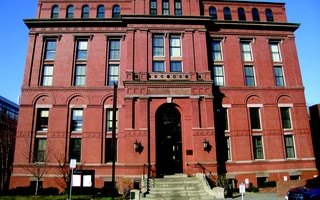{shortcode-16dac71366fdd4663313860f8474825925eaadb8}
A Middlesex Superior Court judge on Tuesday dismissed Connecticut resident Tamara K. Lanier’s lawsuit against Harvard alleging that the University unlawfully possesses and profits from historic photos she says depict her enslaved ancestors.
Lanier plans to appeal the decision, she and one of her attorneys told The Crimson Wednesday.
Lanier’s suit, which she filed against the University in March 2019, centers on the daguerreotypes of two enslaved people named Renty and Delia, which scholars believe to be some of the oldest images of slaves. According to Lanier, they depict her great-great-great-grandfather Renty and his daughter Delia.
Harvard biologist Louis Agassiz commissioned the photos in the 19th century as part of a racist study to prove the biological superiority of white people. Lanier requested in the suit that Harvard turn the daguerreotypes over to her, relinquish any profit made through using, reproducing, or licensing the images, and pay her punitive damages.
Lanier alleged in her suit that the photographs are not legally in Harvard’s possession because they were taken without their subjects’ consent. She also alleged that Harvard has continued to profit from the images by selling an anthropology book with the daguerreotype of Renty on its cover.
Massachusetts Superior Court judge Camille F. Sharrouf, Jr. on Tuesday approved Harvard’s motion to dismiss Lanier’s complaint, partially on the grounds that the statute of limitations had passed and that Lanier did not have property rights to the daguerreotypes.
“Fully acknowledging the continuing impact slavery has had in the United States, the law, as it currently stands, does not confer a property interest to the subject of a photograph regardless of how objectionable the photograph’s origins may be,” Sharrouf wrote.
“Unfortunately, this Court is constrained by current legal principles, as it is the role of the Legislature of Massachusetts and Appellate Courts to determine whether or not to recognize causes of action and to provide the redress Lanier now seeks,” Sharrouf added.
Lanier said she plans to reconvene with her attorneys to begin the process of appealing the decision.
“After the attorneys have a chance to digest what’s written, we’re going to have another strategic conference call, and a session to discuss a way forward,” she said. “But ultimately, I will never let this rest as it is because it is a grave injustice.”
“The court system has failed my enslaved ancestors, and it’s unfortunate, but this is sadly not surprising,” she added.
Joshua D. Koskoff, one of the attorneys representing Lanier in the suit, said he was not surprised by the Court’s decision given the lack of specific precedent for this case, and that he planned to appeal to the Massachusetts Supreme Judicial Court.
“I always expected that the Massachusetts Supreme Court was the right court to address the issues raised in our complaint,” he said.
“This case has a lot of very old legal principles and very established legal principles, but it’s fair to say that it’s also a groundbreaking case,” he added. “We would expect that given the nature of this case, and the importance for the plaintiff but also for future generations, that the Court will take the case.”
Koskoff said that while he agrees legal precedent has generally favored the property rights of those who take a photograph over the photograph’s subject, “the circumstances of this case are different.”
“If every photograph were taken in the manner that this photograph was, where a person was taken in the manner that Renty and Delia were, stripped and photographed to be part of a study with such abhorrent aims, forced against their will, then the law wouldn’t be the way it is,” he said.
Harvard has faced scrutiny in recent years over its historical ties to slavery, and in November 2019, Harvard President Lawrence S. Bacow launched an initiative to study those ties.
In January, Bacow announced that the Peabody Museum of Archaeology and Ethnology — which houses the daguerreotypes — had discovered the remains of at least 15 people who were likely enslaved in its collections.
Responding to Tuesday’s ruling, Harvard spokesperson Rachael Dane wrote in an emailed statement that the University hopes the decision will allow it to find an “appropriate home” for the images.
“The Zealy daguerreotypes are powerful visual indictments of the horrific institution of slavery,” Dane wrote. “We are hopeful the Court’s ruling will allow Harvard to explore an appropriate home for the daguerreotypes moving forward that allows them to be more accessible to a broader segment of the public and to tell the stories of the enslaved people that they depict.”
Samantha C. W. O’Sullivan ’22, the president of the Harvard Generational African American Students Association, which has been engaged in activism supporting Lanier’s case, said she was hopeful the case could establish a new legal precedent for forcing institutions to give up artifacts related to enslaved people.
“Even though the law is on the side of Harvard, it clearly shouldn’t be and I hope that this case can lead to legislative change,” she said.
She added that students will continue to pressure the Harvard administration to “do what’s right.”
Koskoff said he hoped the case would function as a reminder that “the laws that we live under were written by, generally speaking, white men, without consideration for people of color,” he added.
“I’m not in any way accusing anybody at Harvard of harboring racist views,” he said. “I do think we’re dealing with an institutional haughtiness and point of view that is fostered by their position of wealth and power and by their ability to hide behind laws written by white people.”
—Staff writer Oliver L. Riskin-Kutz can be reached at oliver.riskin-kutz@thecrimson.com. Follow him on Twitter @OLRiskinKutz.
Read more in University News
Amid Cornel West’s Tenure Dispute, Faculty and Students Clash Over Harvard’s Treatment Of Black Scholars













